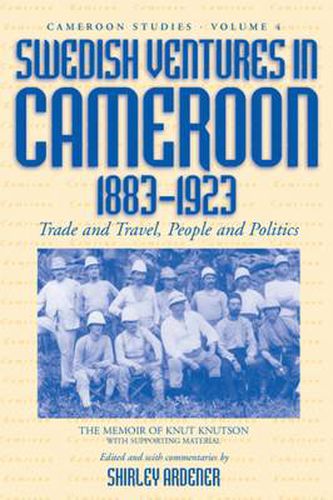Readings Newsletter
Become a Readings Member to make your shopping experience even easier.
Sign in or sign up for free!
You’re not far away from qualifying for FREE standard shipping within Australia
You’ve qualified for FREE standard shipping within Australia
The cart is loading…






The 1880s were a critical time in Cameroon. A German warship arrived in the Douala estuary and proclaimed Cameroon a protectorate. At that time, two Swedes, Knutson and Waldau, were living on the upper slopes of the Cameroon Mountain. Very little is known about their activities. One, Knutson, wrote a long memoir of his time in Cameroon (1883-1895) which is published here for the first time. It gives fascinating insights into everyday life in Cameroon and into the multifaceted relationships among the various Europeans, and between them and the Africans, at the end of the 19th century; we learn about the Swedes’ quarrels first with the Germans and later with the British, over land purchases, thus revealing the origins of long on-going disputes over Bakweri lands. We are given vivid descriptions of Bakweri notables and their, and the Europeans’, cultural practices, a rare eye-witness account of the sasswood witchcraft ordeal, and learn about Knutson’s friendships with slaves. Together with appended contemporary correspondence, legal opinions, and early (translated) texts, this memoir must be considered as a unique and invaluable primary source for the pre-colonial history of Cameroon.
$9.00 standard shipping within Australia
FREE standard shipping within Australia for orders over $100.00
Express & International shipping calculated at checkout
The 1880s were a critical time in Cameroon. A German warship arrived in the Douala estuary and proclaimed Cameroon a protectorate. At that time, two Swedes, Knutson and Waldau, were living on the upper slopes of the Cameroon Mountain. Very little is known about their activities. One, Knutson, wrote a long memoir of his time in Cameroon (1883-1895) which is published here for the first time. It gives fascinating insights into everyday life in Cameroon and into the multifaceted relationships among the various Europeans, and between them and the Africans, at the end of the 19th century; we learn about the Swedes’ quarrels first with the Germans and later with the British, over land purchases, thus revealing the origins of long on-going disputes over Bakweri lands. We are given vivid descriptions of Bakweri notables and their, and the Europeans’, cultural practices, a rare eye-witness account of the sasswood witchcraft ordeal, and learn about Knutson’s friendships with slaves. Together with appended contemporary correspondence, legal opinions, and early (translated) texts, this memoir must be considered as a unique and invaluable primary source for the pre-colonial history of Cameroon.